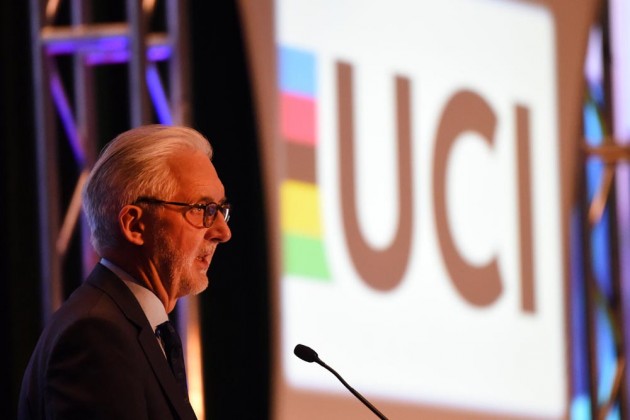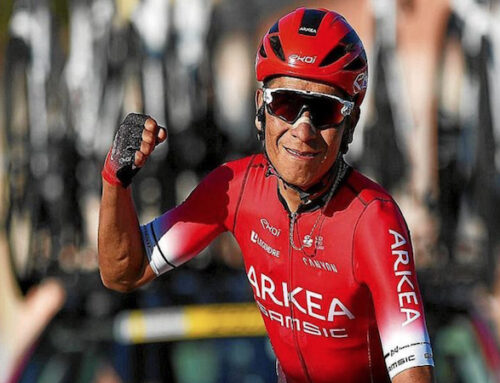Calling Brian Cookson at the UCI. Hi, Brian, WTF?
There is no applause here at Twisted Spoke on the news that TJ Sport squad (formerly Lampre-Merida) has found a last minute sponsor in UAE Abu Dhabi. Along with the new Bahrain-Merida, that makes two teams at the highest level of pro road cycling who have sponsors from countries with significant and disturbing human rights abuses.
Cycling Weekly had already reported that Human Rights groups were protesting to UCI president Cookson about the Bahrain license. Well, folks, double your pleasure.
In our opinion, this shows a desperation on the part of the UCI, the governing body of the sport, to take any sponsor if there is money to be had, no matter matter how deeply flawed the sponsor. It makes a cynical mockery of the UCI review criteria. UAE Abu Dhabi was awarded a two-year license “following a full review of the documentation provided concerning different criteria for awarding of licenses (sporting, financial, administrative and ethical).”
Okay, you’ve got some good riders, check, tons of oil money, check, a team structure in place, check, and then the ethics, uhh, WTF? So they did a full review on ethics? Really? Has the UCI review board ever heard of Google, Wikipedia or Amnesty International? Here’s a few out-takes from the two countries bringing you Ben Swift and Vincenzo Nibali.
Bahrain
From Amnesty International report
“The government continued to curtail freedoms of expression, association and assembly and cracked down further on online and other dissent. Opposition leaders remained imprisoned; some were prisoners of conscience. Torture and other ill-treatment remained common. Scores were sentenced to long prison terms after unfair trials.
A joint statement signed by 35 countries at the UN Human Rights Council in September expressed serious concern about human rights violations in Bahrain including imprisonment of those exercising their rights to freedom of expression, assembly and association, and lack of accountability.
Human rights defender Hussain Jawad, Chairman of the European-Bahraini organization for Human Rights, said he was blindfolded, handcuffed behind his back, denied access to a toilet, beaten and threatened with sexual abuse while under interrogation by CID officers after his arrest in February. Although the Public Prosecution Office ordered his release, CID officers took him back into detention and again tortured him until he “confessed” to receiving money to support and finance subversive groups. He later refuted this confession and lodged a complaint of torture with the Special Investigations Unit (SIU), the institution in charge of investigating police abuses. The SIU subsequently closed the investigation citing a lack of evidence. In December, a court sentenced Hussain Jawad to two years in prison.”
United Arab Emirates
From Amnesty International report
“The authorities arbitrarily restricted freedom of expression, arresting and prosecuting government critics. A new law on combating discrimination and hatred imposed further limits on the rights to freedom of expression and association. Security forces subjected dozens of people to enforced disappearance. Torture and other ill-treatment of detainees was common. Prisoners of conscience remained imprisoned following unfair trials. Women faced discrimination in law and in practice. Migrant workers were inadequately protected by law and faced exploitation and abuse.”
From wikipedia
“Flogging and stoning are legal punishments in the UAE. The requirement is derived from Sharia law, and has been federal law since 2005. Some domestic workers in the UAE are victims of Sharia judicial punishments such as flogging and stoning. The annual Freedom House report on Freedom in the World has listed the United Arab Emirates as “Not Free” every year since 1999, the first year for which records are available on their website.
UAE has escaped the Arab Spring; however, more than 100 Emirati activists were jailed and tortured because they sought reforms. Since 2011, the UAE government has increasingly carried out forced disappearances. Many foreign nationals and Emirati citizens have been arrested and abducted by the state. The UAE government denies these people are being held (to conceal their whereabouts), placing these people outside the protection of the law. According to Human Rights Watch, the reports of forced disappearance and torture in the UAE are of grave concern.”







Leave A Comment